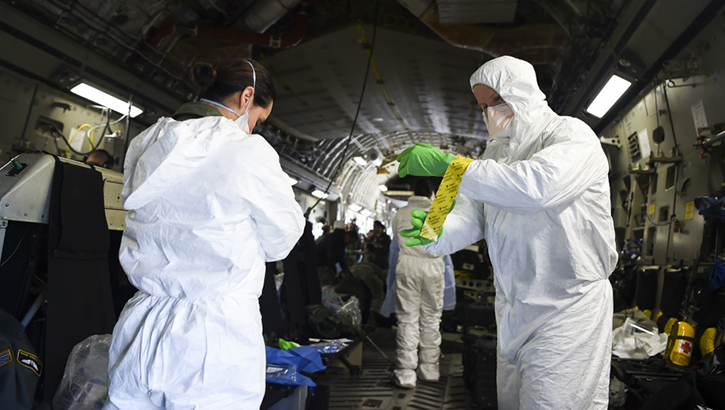Public Health Is Always Political, Coronavirus Is No Exception
by Jo Sutton-Klein
11 February 2020

There are not many national or global issues where rightwing and leftwing views appear to converge, but the immediacy of a burgeoning infectious disease outbreak is one of them. There is no time to quibble about ideological hypotheticals in a situation that is happening right now, when we have only the resources and structures that exist already to deal with it. As a result, even the most ardent libertarians are calling out for government intervention to prevent spread of the catchily named 2019 novel coronavirus.
This rare convergence of opinions presents an opportunity for governments across the world to boost their popularity with outlandish displays of public health policy and propaganda. Gordon Brown’s government spent £1.2 billion responding to the 2009 Swine flu outbreak. There were mass public information campaigns with adverts plastered across the TV and radio. While the British public was being given a crash course on how to wash its hands and sneeze in the correct way, the government ostentatiously purchased 132 million doses of the Tamiflu vaccine. But this wasn’t just a government being cautious, it was a pre-election performance of government capability, not dissimilar to Boris Johnson’s (albeit, less successful) Get Ready For Brexit campaign in the months leading it up to the 2019 general election.
Epidemics, it could be argued, are a particularly useful type of crisis for governments because they are perceived to ignore class divisions, threatening the rich and powerful as much as the poor. In other national crises, safety and comfort can often be bought through wealth; air conditioning can be turned on in heat waves and expensive flood defences can be built to protect wealthier communities from rising water levels. The fact there are relatively few ways in which rich people can buy themselves safety from an infected population means that epidemics attract a disproportionate level of attention and resources compared to other threats to public health, including more significant yet socially patterned diseases. They also show what the state can do to help people when it wants to; at short notice, the UK government was easily able to arrange decent quality accommodation for the Brits who have been repatriated from Wuhan, along with providing them with food and entertainment – yet the millions of people who are in poverty or are homeless have been waiting years for those same resources to be found.
Like all national and international disasters, the novel coronavirus has also gifted governments a convenient excuse to push through rightwing policies, taking advantage of apparent public unity in the fight against a common cause. Across the world countries are closing their borders to China, a move that was criticised by the head of the World Health Organisation (WHO) earlier this month, who said “travel restrictions can cause more harm than good”. The closing of borders is a serious restriction of our freedoms, and it is being done on the basis of hypothetical worst-case scenarios, without any evidence that it will be effective.
We should be as worried now about these racist, restrictive policies as we would be if they were implemented without the excuse of an epidemic. In defending the US’s hardline closure of borders to foreigners who have passed through China, the Director of the Centers for Disease Control and Prevention explained, “This is a serious health situation in China, but I want to emphasize that the risk to the American public currently is low. Our goal is to do all we can do to keep it that way” before admitting, “Right now, there’s a lot of unknowns”.
Even when we can understand the justification for certain restrictions to be put in place, we must constantly question whether that justification continues to be necessary. The World Health Organisation commended China for the measures it put in place to slow the spread of coronavirus. This included preventing all movement in and out of the city of Wuhan – denying 11 million people the right to travel across the country. We should never let actions like these become normalised, even if we acknowledge that for a short period of time they may be necessary.
The novel coronavirus outbreak does bring some silver linings to the left too – two new hospitals have been built from scratch in Wuhan in just over two weeks – making Johnson’s promise of six new hospitals over 10 years look rather paltry. Health workers in Hong Kong rapidly created a new cross-discipline union who have completed their first strike in protest at the Hong Kong government’s handling of coronavirus. These actions have the potential to bring lasting benefits to the populations they serve.
So, as the novel coronavirus spreads in the UK we should expect not just a carefully orchestrated performance from the government, but attempts to further their political agenda. Though maybe there’s a glimmer of hope that the billions of pounds that the government will undoubtedly find to respond to the virus might be spent on long-lasting projects – two weeks to build a new hospital while maintaining decent working conditions for the builders might be too ambitious, but surely we can get one up in a month?
Jo Sutton-Klein is a junior doctor.